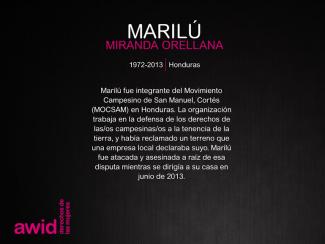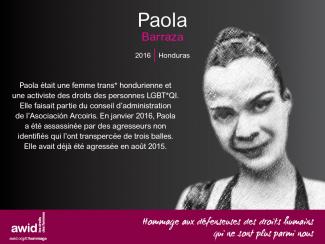
Paola Barraza

AWID’s Tribute is an art exhibition honouring feminists, women’s rights and social justice activists from around the world who are no longer with us.
This year’s tribute tells stories and shares narratives about those who co-created feminist realities, have offered visions of alternatives to systems and actors that oppress us, and have proposed new ways of organising, mobilising, fighting, working, living, and learning.
49 new portraits of feminists and Women Human Rights Defenders (WHRDs) are added to the gallery. While many of those we honour have passed away due to old age or illness, too many have been killed as a result of their work and who they are.
This increasing violence (by states, corporations, organized crime, unknown gunmen...) is not only aimed at individual activists but at our joint work and feminist realities.
The portraits of the 2020 edition are designed by award winning illustrator and animator, Louisa Bertman.
AWID would like to thank the families and organizations who shared their personal stories and contributed to this memorial. We join them in continuing the remarkable work of these activists and WHRDs and forging efforts to ensure justice is achieved in cases that remain in impunity.
“They tried to bury us. They didn’t know we were seeds.” - Mexican Proverb
It took shape with a physical exhibit of portraits and biographies of feminists and activists who passed away at AWID’s 12th International Forum, in Turkey. It now lives as an online gallery, updated every year.
To date, 467 feminists and WHRDs are featured.
El creciente poder de los actores anti-derechos no se está desarrollando en un vacío. Entender el auge del ultranacionalismo, del poder corporativo irrestricto, del incremento de la represión y de la disminución del espacio cívico resulta clave para contextualizar las amenazas anti-derechos que enfrentamos actualmente.

Hoy en día, una cantidad considerablemente mayor a la mitad de la población mundial está gobernada por líderes de extrema derecha. En este escenario, lxs defensorxs de derechos humanos y lxs feministas están trabajando arduamente para «mantenerse firmes» y proteger el multilateralismo y el sistema internacional de derechos humanos. También enfrentan el riesgo de que su compromiso acarree represalias violentas. Al mismo tiempo, estas instituciones están cada vez más sujetas a los intereses del sector privado. Las grandes empresas (en particular, las corporaciones transnacionales) están ocupando asientos en la mesa de negociación y posiciones de liderazgo en una gran cantidad de instituciones multilaterales, incluida la ONU. Este nexo de ultranacionalismo, espacio cívico restringido y captura corporativa está teniendo un tremendo impacto sobre la posibilidad de que, alguna vez, logremos obtener derechos humanos para todxs.

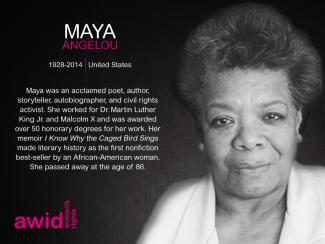
الصدمة ليست الحدث؛ إنها أجسادنا التي تستجيب للأحداث التي تشعرنا بخطرها علينا. وفي أغلب الأحوال تبقى عالقة في أجسادنا، إلى أن نتعامل معها. لا يوجد حديث عن أجسادنا خارج هذه الاستجابة – لأنها كذلك.
Marielle fue una política brasileña feminista lesbiana y activista por los derechos humanos.
Criticó abiertamente la brutalidad policial y las ejecuciones extrajudiciales. Su política declaradamente feminista, negra, centrada en las favelas, fue una fuente de esperanza para los grupos marginados de Río de Janeiro, gobernados actualmente por un gobierno municipal conservador y un intendente evangélico.
El 14 de marzo de 2018, después de dar un discurso en Río de Janeiro, Franco y su chofer fueron asesinados a balazos. A partir de la noticia de su muerte, multitudes se volcaron a las calles al grito de «¡Marielle presente!», en demanda de justicia.
En esta nota se puede leer más sobre Marielle y la situación en Brasil

Alors que les fondamentalismes, les fascismes et autres systèmes d’oppression se métamorphosent et trouvent de nouvelles tactiques et stratégies pour consolider leur pouvoir et influence, les mouvements féministes persévèrent et célèbrent leurs victoires nationales, régionales et internationales.

La [MB1] reconnaissance en 2019 par le Conseil des droits de l’Homme du droit à l’intégrité et à l’autonomie corporelles, par exemple, a marqué une étape cruciale. Des résolutions du Conseil sur la discrimination envers les femmes et les filles admettent cependant un recul lié à des groupes de pression rétrogrades, des conceptions idéologiques ou un détournement de la culture ou la religion pour s’opposer à l’égalité de leurs droits. Des avancées féministes sont aussi notées dans le travail des Procédures spéciales, qui soulignent notamment l’obligation des États de contrer les doctrines de l’idéologie du genre, rappellent à l’ordre les antidroits qui détournent des références à la « culture », et signalent que les convictions religieuses ne peuvent pas servir à justifier la violence ou la discrimination.
Related Content
Front Line Defenders: Emilsen Manyoma Killed
ReliefWeb: A human rights defender killed every other day in 2017 in Colombia (between 1 and 23 January 2017)
Global Witness: Defenders of the Earth (2016 Report)
okayafrica.: Who is Killing Colombia's Black Human Rights Activists?
PBI Colombia: We will always accompany your work
Bitch Media: Don’t Touch My Crown: The failure of decapitation and the power of black women’s resistance

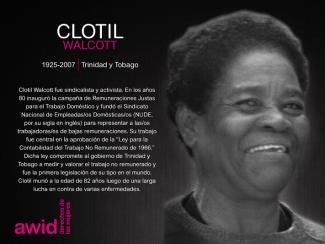
« Si on peut hériter de traumatismes, peut-on aussi hériter d’une impression en lien avec l’amour? »
 |
Hind et Hind étaient le premier couple queer documenté dans l’histoire arabe. Dans le monde d’aujourd’hui, iel est un·e artiste queer du Liban. |

À l’âge de six ans, j’appris que mon grand-père avait un cinéma. Ma mère me raconta comment il l’avait ouvert au début des années 1960, quand elle avait également à peu près six ans. Elle se rappelait qu’il avait projeté La Mélodie du bonheur le soir de l’ouverture.
Je passais au cinéma tous les week-ends et regardais mon grand-père jouer au backgammon avec ses amis. Je ne savais pas qu’il vivait là, dans une pièce située juste en dessous de la cabine de projection. J’appris plus tard qu’il y avait emménagé à la suite de la séparation d’avec grand-mère, et de la fermeture du cinéma dans les années 1990, peu après la fin de la guerre civile libanaise.

Pendant des années et jusqu’à son décès, je voyais généralement mon grand-père jouer au backgammon à l’accueil du cinéma, qui n’était plus du tout entretenu. Ces scènes à répétition sont mes seuls souvenirs de lui. Je n’ai jamais vraiment appris à le connaître – on ne parlait jamais de cinéma, malgré qu’il ait passé tout son temps dans un cinéma en déperdition. Je ne lui ai jamais demandé ce que ça faisait de vivre dans un lieu comme celui-là. Il est mort quand j’avais 12 ans, le soir de Noël, d’une chute dans l’escalier en colimaçon qui montait jusqu’à la cabine de projection. C’est presque poétique qu’il soit mort en mouvement, dans une maison où les images en mouvement sont perpétuellement suspendues dans le temps.

Au printemps 2020, mon cousin m’a appelée pour me dire qu’il avait nettoyé le cinéma de mon grand-père et me demandait de le retrouver là-bas. Tous les deux, nous avions toujours rêvé de remettre le cinéma sur pied. J’arrivai sur place avant lui. À la réception, des cadres d’affiches étaient toujours accrochés aux murs… mais les affiches avaient disparu. Je savais qu’il devait rester des souches de places de ciné quelque part. Je les ai toutes trouvées dans une petite boîte en fer, sur une étagère derrière le bureau de l’accueil, et j’en ai profité pour en glisser quelques-unes dans ma poche.
Je commençai à me promener dans le ciné. Sur la scène principale, l’écran de projection était plutôt sale et quelque peu abîmé sur les côtés. Je passai mon index sur l’écran pour enlever une couche de poussière, et remarquai qu’il était toujours bien blanc en dessous. La toile semblait également en bon état. Je levai la tête pour voir si les rideaux de ma grand-mère, faits de satin blanc et arborant un petit emblème en lisière à l’effigie du cinéma, étaient toujours en place. Dans la pièce, il y avait une salle basse, une salle principale et un balcon. Les chaises semblaient vraiment très usées.
Je remarquai le projecteur qui dépassait d’une petite fenêtre à l’extrémité des places au balcon. Je gravis les marches en colimaçon jusqu’à la cabine de projection.
La pièce était sombre mais une source de lumière provenant des fenêtres poussiéreuses tombait sur une pile de bobines de films dans un coin. Des bandes de celluloïde sans vie gisaient emmêlées au pied du projecteur. Les bobines poussiéreuses étaient toutes des westerns, des films de Bollywood et de science-fiction, avec des titres horribles comme La Météorite qui détruisit la Terre, ou d’autres du même genre. Certaines d’entre elles attirèrent mon attention, et notamment de petites bandes de pellicule. Une par une, les bandes montraient différentes scènes de baisers, des danses suggestives, une vague scène de rassemblement, un gros plan d’une femme allongée bouche ouverte, le générique de début d’un film de Bollywood, et une étiquette « Actuellement à l’affiche » répétée sur plusieurs images.
Les génériques des films de Bollywood me rappelaient ma mère. Elle me racontait qu’on distribuait des mouchoirs aux spectateurs et spectatrices à la fin des projections. Je conservai les bandes avec les scènes de baisers et de danses suggestives, supposant qu’elles avaient été coupées pour des raisons de censure. Le gros plan sur la femme me rappela un extrait du film Visible Man de Béla Balázs, ou The Culture of Film, The Spirit of Film ou encore The Theory of the Film. Mon grand-père disait que les gros plans dans un film étaient comme un
soliloque silencieux, dans lequel un visage peut parler avec des nuances de sens les plus subtiles, sans sembler artificielles ni rappeler la distance des spectateurs. Dans ce monologue silencieux, l’âme humaine solitaire peut trouver une langue plus candide et désinhibée que tout soliloque parlé, car elle s’exprime instinctivement, subconsciemment.

Balázs décrivait surtout les gros plans de Jeanne dans le film muet La Passion de Jeanne d’Arc. Il remarquait combien « … dans le (cinéma) muet, l’expression faciale, isolée de son environnement, semble pénétrer une étrange nouvelle dimension de l’âme ».
J’examinai plus précisément la bande de pellicule. La femme semblait morte, son visage semblable à un masque. Cela me fit penser à l’Ophélie du peintre John Everett Millais. Dans son livre On Photography, Susan Sontag dit que la photographie est « une trace, quelque chose de marqué directement sur la bobine, comme une empreinte ou un masque mortuaire ». Ces masques mortuaires sont comme une présence qui rappelle une absence.
Je me souviens de ma rencontre avec un discours sur la mort et la photographie dans le film The Machine that Kills Bad People de Roberto Rossellini, tombé dans l’oubli. Dans ce film, un cameraman prend des photos de gens, qui sont alors figés, puis suspendus dans le temps. Le critique de cinéma français André Bazin disait que la photographie capture les corps hors du flux de l’amour et les conserve en les embaumant. Il décrivait cette momification photographique comme étant « la préservation de la vie par une représentation de la vie ».
Cette cabine de projection, sa disposition et toutes les choses qui semblaient avoir été déplacées, y compris les bandes de pellicules sur le sol, tout ce sur quoi mon grand-père avait laissé sa marque – je voulais absolument tout protéger.
Sous les bandes de pellicule reposait une bobine de film poussiéreuse intacte. On aurait dit que quelqu’un avait regardé le film en faisant dérouler la pellicule à la main. C’est à ce moment que mon cousin arriva en haut de l’escalier en colimaçon et me trouva en train de l’examiner. Se frottant le menton du bout des doigts, de manière très factuelle, il me dit : « Tu as trouvé le porno ».

J’observai la bande de film dans ma main et réalisai que ce n’était pas une scène de décès. La bande avait été coupée de la bobine d’un porno. La femme gémissait d’extase. Les gros plans servent à communiquer des sentiments d’intensité, d’extase, mais je n’avais jamais vraiment utilisé les théories de Balázs pour décrire une scène porno. Il écrivait « le paroxysme dramatique entre deux personnes sera toujours présenté comme un dialogue d’expression faciale en gros plan ». Je fourrai les bandes de films dans ma poche et donnai à la femme le nom d’Ishtar. Elle vit dans mon portefeuille depuis. Il semble étrange de comparer la représentation détaillée des peurs et du courage de Jeanne avec l’expression faciale orgasmique d’Ishtar.
D’après mon cousin, le frère de mon grand-père attendait que ce dernier ait quitté le cinéma et, au lieu de le fermer, il invitait ses amis à des projections privées. Je n’en pensais pas grand-chose. C’était une pratique courante, surtout pendant et après la guerre civile au Liban. Après la guerre, il y avait des téléviseurs dans presque tous les foyers libanais. Je me souviens même en avoir un dans ma chambre à la fin des années 1990, quand j’avais à peu près six ans. On m’avait dit que c’était courant d’acheter des films porno en cassette VHS à l’époque. Mohammed Soueid, un écrivain et réalisateur libanais, m’a dit un jour que les cinémas projetaient des films d’art et d’essai et de pornographie de la moitié des années 1980 à la moitié des années 1990, pour survivre. J’ai aussi entendu dire que les projectionnistes découpaient les bobines de films porno pour modifier les montages et pouvoir projeter quelque chose de différent chaque soir. Les gens sont finalement restés confortablement chez eux à regarder des cassettes VHS sur leur téléviseur, et les cinémas ont commencé à décliner.

Mon cousin redescendit pour consulter les archives administratives dans le bureau.
Je restai dans la cabine et commençai à faire glisser la bande entre mon index et mon majeur, la relevant avec les pouces pour faire lentement défiler les images entre mes mains. Je levai les mains pour capter la lumière de la fenêtre poussiéreuse et plissai les yeux pour tenter de deviner ce que cachaient les vignettes monochromes. Dans cette série d’images figurait un gros plan exagéré d’une bite plantée dans un vagin. L’image se répétait sur plusieurs cadres, jusqu’à ce que j’arrive à un nœud dans la bande, et que j’imagine le reste.


Hank exhibe son érection devant Veronika, couchée sur un lit à côté d’un faux secrétaire Louis XIV. Elle se lève lentement et fait glisser la fine bretelle de sa nuisette transparente de son épaule gauche. Hank dénoue sa robe de voile, la retourne, lui donne une claque sur les fesses et la pousse contre le secrétaire. Il enfonce sa bite dans sa chatte de manière répétée, alors que l’arrière du meuble frappe contre le mur tapissé.


Je fais toujours attention aux décorations intérieures depuis que mon enseignante en Études des femmes dans le porno m’a dit que les plus grandes archives de porno d’Amérique du Nord sont utilisées, de manière intéressante, pour examiner le mobilier de la classe moyenne de l’époque. Donc, alors que Veronika se penche et se fait prendre par derrière par Hank, une assistante en recherche universitaire pourrait tout aussi bien tenter de deviner le design du motif doré sur le secrétaire, ou étudier le relief rococo d’une chaise en bois dans un coin.
Pendant un moment, la cabine est devenue un espace d’imagination sexuelle féminine, perturbant un espace généralement promis à la liberté de la sexualité masculine. J’étais sûre que seuls les hommes pouvaient accéder aux cinémas qui diffusaient des films porno. La bobine de film était trop emmêlée pour pouvoir être démêlée dans une cabine de projection où la poussière s’accumulait depuis une décennie, donc je la fourrai dans mon sac de sport et sortis du cinéma.
Je ne sais pas ce qui m’a pris, mais je me suis sentie obligée de la garder. Je voulais ressentir l’excitation de garder quelque chose de mystérieux, quelque chose de non orthodoxe. Dans mon esprit, j’étais sûre que les gens savaient que je cachais quelque chose pendant que je descendais la rue. J’étais prise d’un sentiment de culpabilité mêlée de plaisir. Je me sentais perverse.

J’entrai dans la maison, préoccupée par le fait d’avoir une bobine de porno dans mon sac de sport et le fil de mes pensées qui s’était déroulé sur la route du retour à la maison. Je me dirigeai immédiatement vers ma chambre. Dans un coin un peu éloigné de mon esprit, je me suis rappelée que derrière mon mur se trouvait la chambre de Layla. Elle n’était probablement pas à la maison, mais la possibilité d’être entendue m’excitait. Je fermai la porte de ma chambre et sortis la bobine du film d’Ishtar.
Je l’imaginais habillée d’une légère robe en voile verte, dansant de manière suggestive devant moi, balançant ses hanches et me souriant du regard. Je m’allongeai sur mon lit et glissai mes doigts dans ma culotte. Soulevant mes hanches, je fis descendre ma main entre mes cuisses pour les écarter et glisser deux doigts à l’intérieur. Je me tendis en caressant mes plis chauds. Je gémis avant même de pouvoir m’arrêter. Je haletai et remuai mes reins. Les rayons de soleil qui entraient par la fenêtre me plaquaient des baisers sur la peau sans le vouloir. Je retenais mon souffle et mes membres tremblaient. J’avalai un cri et reposai à plat sur le matelas.

Quand j’étais en premier cycle à l’université, je suivais un cours d’Introduction au cinéma et la professeure, Erika Balsom, avait prévu une projection du Variety de Bette Gordon. J’étais excitée à l’idée de regarder le premier film de la productrice Christine Vachon, avant qu’elle ne se mette à produire des films qui font maintenant partie du mouvement du Nouveau cinéma queer. Variety était décrit comme un film féministe sur Christine, une femme qui commence à travailler à la billetterie d’un cinéma porno de New York appelé The Variety Theater. Christine peut entendre le son des films au cinéma, mais ne pénètre jamais dans les salles. Elle finit par s’intéresser à un client régulier, qu’elle observe de près. Elle le suit dans une boutique pour adultes où elle se tient à l’écart et feuillette des magazines pour adultes pour la toute première fois.
Le voyeurisme de Christine est affiché de différentes manières tout au long du film. Le script est également très chargé et contient des monologues érotiques qui seraient aujourd’hui considérés obscènes ou vulgaires.
Dans une scène qui se déroule dans une salle de jeux, elle lit de la littérature érotique à son copain. La caméra fait des allers-retours entre des gros plans des fesses de son copain Marc qui joue au flipper, faisant des mouvements de va-et-vient avec ses hanches contre le flipper, et un gros plan du visage de Christine qui lui récite son monologue.

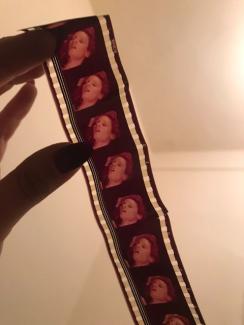
« Sky fait du stop et est pris par une femme qui conduit une camionnette. Il est tard et il a besoin d’un endroit où dormir, elle lui propose donc de dormir chez elle.
Elle lui montre sa chambre et lui propose un verre. Ils boivent en discutant, puis décident d’aller se coucher. Ne parvenant pas à dormir, il remet son pantalon et traverse le hall jusqu’au salon. Il s’arrête avant de pouvoir être vu, mais il peut voir la scène. La femme est allongée nue sur la table basse, dont seules les jambes dépassent. Tout son corps est d’une blancheur excitante, comme s’il n’avait jamais été exposé au soleil. Ses mamelons sont d’un rose brillant, en feu, presque des néons. Ses lèvres sont entrouvertes. Sa longue chevelure de couleur châtain touche le sol; au bout de ses bras tendus, ses doigts caressent l’air. Son corps huilé est tout en rondeurs, sans angle ni os saillants. Glissant sur sa poitrine, un gros serpent entoure un de ses seins et descend contre le second. La langue du serpent lui lèche la chatte, si ouverte, si rouge dans la lumière de la lampe. Chaud et confus, l’homme retourne à sa chambre et, avec beaucoup de difficulté, parvient à s’endormir. Le lendemain matin, autour d’un bol de fraises, la femme lui demande de rester une autre nuit. Une fois encore, il ne parvient pas à dormir […] »

Quand j’avais 23 ans, Lynn, la fille de mon cours de cinéma avec qui je sortais, m’a prise par surprise en m’emmenant regarder des court-métrages érotiques le jour de la Saint-Valentin. L’événement avait lieu au Mayfair Theater, un vieux cinéma indépendant. L’architecture du cinéma rappelait les Nickelodéons d’Amérique du Nord, mais en plus vieillot. Ses balcons étaient décorés avec des cartons de Swamp Thing et d’Alien en taille réelle.
Cette année-là, le jury du festival était présidé par la star de cinéma pour adultes Kacie May, et le programme composé de court-métrages d’une heure et demie. Le contenu allait de courts-métrages soft sans machisme à des films scato fétichistes. Nous avons regardé quelques minutes de ce qui semblait être un porno hétérosexuel soft. Le film suivait un couple qui commence à faire l’amour dans un salon moderne, puis passe à la chambre. Il s’agissait surtout de scènes des deux en train de s’embrasser, se toucher et faire l’amour en position du missionnaire. Puis une femme avec un bob châtain entre dans leur lit, se léchant le dos de la main à petits coups de langue. Elle miaule et grimpe sur le couple, qui ne semblait pas y faire attention. Le couple continue à faire l’amour. Elle va alors jusqu’à la cuisine, ramasse son bol vide avec les dents et le dépose sur un coussin. Elle continue à faire des aller-retours jusqu’au couple pendant tout le reste du film. Cela semblait plutôt absurde. J’ai commencé à rire, mais Lynn avait l’air un peu mal à l’aise. J’ai alors regardé sur notre gauche et vu d’autres spectateurs et spectatrices se passer des bières et se gaver de pop-corn, tout en riant hystériquement. Leur rire ininterrompu et leurs commentaires à haute voix donnèrent le ton du festival. Regarder les spectatrices et les spectateurs est devenu plus intéressant que de regarder les films érotiques. Le Mayfair Theater projetait souvent des films culte, et regarder des films culte est une expérience de communion.
Ce n’est pas exactement la manière dont j’imaginais que l’oncle de ma mère regardait du porno au cinéma de mon grand-père. Les cinémas projetaient de manière évidente des films porno à l’époque, mais je ne pouvais imaginer cela se dérouler dans la ville de naissance de ma mère. Je l’imaginais regarder le film depuis le projecteur dans la cabine afin de pouvoir rapidement arrêter la projection en cas d’arrivée inopinée d’autres personnes. Ses amis prenaient place au balcon à l’arrière. Personne ne pouvait entrer à moins d’avoir la clé, donc ils étaient en sécurité. Ils devaient penser à tout. C’était un quartier chrétien conservateur et ils ne voulaient surtout pas causer d’ennuis. Ils étaient probablement dépassés par des sentiments d’excitation et de culpabilité. Les voix fortes de plaisanteries homoérotiques se mélangeaient à des gémissements et des râles, mais ils se rappelaient mutuellement de baisser le ton toutes les quelques minutes. Ils se relayaient à la fenêtre pour vérifier que les bruits ne pouvaient pas interpeller les voisins. Ils éteignaient parfois les haut-parleurs et regardaient sans le son.

Après une manifestation politique en 2019, je suis tombée sur un bouquiniste sur la rue Riad El Solh, près de la Place des martyrs dans le centre de Beyrouth. Au bout d’une des tables, passés les exemplaires d’Hugo et de Beauvoir, je trouvai une pile de romans érotiques et de magazines pour adultes. C’étaient des traductions de publications occidentales. J’en pris une vraiment au hasard; tout ce que je voulais, c’était détenir un exemplaire, juste pour le frisson. J’ai cherché celui avec la couverture la plus artistique.
En me rendant ma monnaie, le vendeur me demanda : « Je ne t’ai pas déjà vue quelque part? ». Il se mit à observer ma poitrine, descendant le regard plus bas. Il supposait probablement que je travaillais dans l’industrie du sexe ou du porno. Je le regardai bien dans les yeux et lui répondis que « Non ». Je fis demi-tour, prête à m’éloigner avec mon magazine. Il m’arrêta alors pour me dire qu’il avait beaucoup d’archives dans son sous-sol, et qu’il vendait régulièrement des collections et des publications de porno sur eBay, vers l’Europe et les États-Unis. J’aurais bien été intéressée à fouiller dans ses archives, mais je n’étais pas à l’aise et déclinai son offre. Je ne me sentais pas en sécurité. Je lui demandai où il trouvait ses romans. À ma grande surprise, ils étaient publiés au Liban.
En me dirigeant vers la statue de Riad El Solh, je parcourus la publication que j’avais achetée et trouvai le format du texte quelque peu démodé; les caractères de police étaient un peu flous, rendant le texte illisible. Les photographies à l’intérieur étaient faites de collages pornographiques aux couleurs passées. Ça paraissait assez cru; ça me plaisait. Le roman avait pour titre Les journaux intimes de Marcel.
La couverture était de manière évidente un découpage de magazines collés sur une feuille bleue. Sur l’image, une femme torse nu attrape la tête de son amant, enfonçant ses doigts dans ses cheveux, pendant qu’il lui embrasse le cou par derrière. La fermeture de sa jupe est entièrement descendue. Son amant à la main sur le bas de sa hanche droite. Sa main à elle est sur la sienne. Ses lèvres sont retroussées et entrouvertes, comme si elle gémissait de plaisir, ses cheveux blonds et raides à la mode des années 1970 descendant sur sa poitrine et couvrant partiellement ses mamelons.
J’ouvris la première page. La préface indiquait
ce qui se traduit par
« Désir
et débauche »
ou par
« Désir
et perversion »
Je lus le premier chapitre et réalisai que la personne qui avait traduit le texte avait changé le prénom du personnage principal en Fouad, un prénom arabe. Je supposai que l’idée était que le lectorat masculin libanais s’identifie à l’histoire. En continuant ma lecture, je réalisai que toutes ses amantes portaient des noms étrangers comme Hanna, Marla, Marcel, Marta.


Je réalisai à la page 27, chapitre quatre, que Marcel était un des amants de Fouad.

La scène avait lieu dans un cinéma. Les cinémas étaient souvent des espaces de liberté sexuelle en Amérique du Nord, et particulièrement depuis les années 1970, suite à la révolution sexuelle.
Je supposais également que tous les noms étrangers avaient été conservés pour donner une touche exotique au texte et le rendre moins tabou. La pornographie et l’érotisme étaient attribués à Hollywood, bien que le monde arabe ait de tout temps produit des textes érotiques. L’érotisme est devenu tabou, et la seule manière d’en produire sans danger est de le commercialiser comme un produit étranger, exotique.
Il est intéressant de noter comment l’exotique couvre l’érotique. La différence entre les deux adjectifs remonte à leur étymologie grecque respective : exotique vient de exo, « extérieur », qui signifie également autre, étranger; tandis qu’érotique est dérivé d’Éros, le dieu de l’amour sexuel. Donc, ce qui est exotique est mystérieux étranger – et ce qui est érotique est sexy.
Au Liban, la distinction entre l’exotique et l’érotique au cinéma est très ténue, tout comme la frontière entre films d’art et films porno. En 2015, lors d’une conversation avec la réalisatrice Jocelyne Saab dans un restaurant vietnamien de Paris, j’appris qu’elle avait dû tourner son film Dunia une deuxième fois pour modifier le dialecte égyptien en dialecte libanais. Elle me dit que ses acteurs et actrices étaient égyptiennes et égyptiens, et qu’elle n’était pas très stricte quant au script. Elle n’avait cependant pas le droit d’utiliser le dialecte égyptien. Le film devait être en libanais parce que les producteurs s’inquiétaient des scènes érotiques un peu limites dans le film. Ils en ont donc fait un film étranger.
Contenido relacionado
Norte Digital de Ciudad Juárez: Cerramos en protesta
La Jornada: Brazo del ‘cártel’ de Sinaloa ordenó asesinar a Miroslava Breach: FGE
BBC: Miroslava Breach, la periodista “incómoda” asesinada en México cuando llevaba a su hijo a la escuela
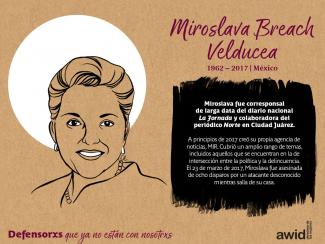
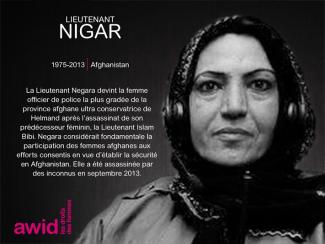

جلسة عامة | إنّها قادمة: بدائل وأشكال متعددة من النسوية وعالم آخر
مع د. فاندانا شيفا ود. ديلار ديريك ونانا أكوسوا هانسو
Sue was an artist, activist and teacher born in 1936 in Maryland, USA.
Sue created art for women, about women. As a lesbian feminist, and for a time, a separatist, she was committed to creating women-only spaces. In 1976 she purchased land that is still held by women who visit to make art. Sue took a fierce stand on the protection of women and girls.
With her groundbreaking futuristic, classical and anthropological approach, she filled any room she entered with intellect, authentic eccentricity, unforgiving wit, and humor. Her ideas about consciousness and creativity continue to inspire many people.


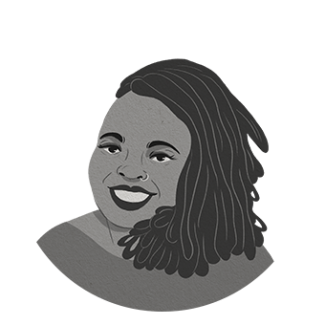 |
تشيخوفاتسو سيني هي نسوية كويرية سوداء، تعاني من أمراض مزمنة، وهي تعمل أكثر من غيرها. الكثير من عملهم متجذّر في المتعة، والمجتمع، والحلم، بينما يتمّ إعلامهم من خلال الإلغاء الجسدي والإعاقة، والشفاء، والعدالة التحويلية. الكتابة والبحث والتحدّث حول القضايا المتعلقة بالنسوية والمجتمع والعدالة الجنسية والإنجابية والموافقة وثقافة الاغتصاب والعدالة، لدى تشيغوفاتسو خبرة 8 سنوات في التنظير حول الطرق التي تتقاطع بها هذه الموضوعات مع المتعة. يديرون أعمالهم الخاصة بعنوان Thembekile Stationery، ومنصّة Hedone تجمع الناس معًا لاستكشاف وفهم قوة الوعي بالصدمات والمتعة في حياتهم اليومية. |
الجسد، وليس العقل المفكّر، هو المكان حيث نشعر بالألم، واللذة، والفرح، وحيث يجري أغلب ما يحصل لنا. وهو أيضاً المكان الذي نعالج فيه أنفسنا، من ضمنها تحقيق الشفاء النفسي والعاطفي. وهو المكان الذي نشعر فيه بالمرونة والإحساس بالتدفّق.
هذه الكلمات التي كتبها ريسما ميناكيم في كتابه: «يدَي جدّتي»، بقيت معي.
الجسد؛ يحمل خبراتنا. ذكرياتنا. مرونتنا. وكما كتب ميناكيم، الجسد يحمل كذلك صدماتنا. يستجيب من خلال آليات وقائية عفوية لوقف أو منع المزيد من الضرر. قوة الجسد. الصدمة ليست الحدث؛ إنها أجسادنا التي تستجيب للأحداث التي تشعرنا بخطرها علينا. وفي أغلب الأحوال تبقى عالقة في أجسادنا، إلى أن نتعامل معها. لا يوجد حديث عن أجسادنا خارج هذه الاستجابة – لأنها كذلك.
من خلال استخدامي لتطبيق ديجيتال سوبرباور– Digital Superpower من شركة لينغ تان Ling Tan، تتبّعت كيف كان جسدي يشعر كلّما مشيت في أرجاء مختلفة من مدينتي، جوهانسبورغ، في جنوب أفريقيا. التطبيق هو كناية عن منصّة عبر الإنترنت تعتمد على الإيماءات التي تتيح لك ملاحقة تصوّراتك خلال تحرّكاتك في المواقع من خلال الدخول وتسجيل بياناتك. استعملت التطبيق لتتبّع العوارض البدنيّة-النفسيّة، أي ردود الفعل الجسدية المرتبطة بأسباب عقلية. سواء كان ذلك عبارة عن ذكريات، نوبات هلع، الآلام في الصدر، تسارع في ضربات القلب، آلام الرأس، آلام العضل، أرق، صعوبة بالتنفس. تتبّعت هذه العوارض كلّما كنت أمشي أو أتنقّل في مناطق مختلفة من جوهانسبورغ. وسألت نفسي:
أين يمكن أن نكون آمنات؟ هل يمكن أن نكون آمنات؟
يمكن أن تحصل ردود الفعل البدنيّة-النفسيّة بسبب مجموعة من الأمور، وبعضها ليس شديد الوقع كالبعض الآخر. بعد اختبار أي نوع من الصدمات يمكن أن تشعرك بضيق كبير في أحداث أو مواقف مشابهة. تتبّعت أحساسي، وقيّمت على مقياس يتراوح ما بين 1 إلى 5، رقم 1 يرمز إلى الحالات التي بالكاد شعرت فيها بأيٍّ من هذه العوارض – شعرت بالراحة عوضاً عن الحذر والقلق، وكان تنفّسي وضربات قلبي مستقرة، ولم أنظر إلى الخلف – أما رقم 5 فيرمز إلى العكس – العوارض التي جعلتني أشعر باقتراب الإصابة بنوبة هلع.
كشخص أسود البشرة، كشخص كويري، كشخص كويري جندرياً، يُصار إلى النظر إليه كإمرأة، تبعاً للتمظهر الجندري المُختار في يومٍ مُعيّن.
سألت نفسي.
أين يمكننا أن نكون آمنات؟
حتى في الأحياء التي يمكن اعتبارها «آمنة»، شعرت بالذعر المستمرّ. أنظر حولي للتأكّد من عدم وجود مَن يلاحقني، أعدِّل ملابسي حتى لا يظهر ثدياي كثيراً، وأتلفّت حولي للتأكّد من وجود عدّة مخارج للهروب من المكان في حال شعرت بالخطر. الطرقات الفارغة تسبِّب لي القلق. كذلك الطرقات المكتظّة. وعندما أستقلّ سيارة «أوبر». وعندما أمشي في الطرقات العامّة. وأن أكون في شقتي كذلك الأمر. إضافة إلى استلام أغراضي من خدمة التوصيل من أمام المبنى.
هل يمكن أن نكون آمنات؟
تكتب بوملا دينيو جكولا عن مصنع الخوف النسائي. قد يبدو هذا مألوفاً أو لا، لكن، إذا كنتِ امرأة اجتماعياً، ستعلمين هذا الشعور بشكل جيد. الشعور الذي يدفعك إلى التخطيط لكلّ خطوة تخطينها، سواء في طريقك إلى العمل، أو المدرسة أو مجرد القيام بمهمّة ما. الشعور الذي يتملّكك عند ملاحظة كيف هي ملابسك وتصرّفاتك وحديثك في الأماكن العامّة والخاصة. الشعور بالألم في رأس معدتك إذا كان عليك التنقّل ليلاً، للحصول على أغراضك من خدمة التوصيل، أو التعامل مع شخص يستمرّ بالتواصل مع الناس اجتماعياً كرجل مُطابقٍ جنسياً. التحرّش في الشوارع، والتهديد المتواصل بالعنف. نحن الموجودات في أي مكان يأتينا الخوف فطرياً.
الخوف هو ظاهرة فردية واجتماعية-سياسية في الوقت عينه. على المستوى الفردي، يمكن أن يكون الخوف موجوداً كنظامٍ داخليّ صحيّ للتحذير الذاتي […] عندما نفكّر عن الخوف، من المهمّ الاحتفاظ بمفهومَي التجربة العاطفية والطرق السياسية التي يُستخدم فيها الخوف في مختلف العصور للسيطرة.
- بوملا دينيو جقولا، في كتابها «الاغتصاب: كابوس جنوب إفريقي»

تعرف النساء الجنوب إفريقيات والكويريات، كيف أنّ كلّ خطوة تخطينها خارج المنزل – خطوات للقيام بأمور عادية: التوجّه إلى المتجر، استقلال التاكسي للذهاب إلى العمل، أو «الأوبر» للذهاب إلى حفلة – كلّ هذه الأفعال هي تفاوض مع العنف. الخوف، هو جزء من الصدمة. للتغلّب على الصدمة التي نحملها داخل أجسادنا، نطوّر استجابات لتحسسّ الخطر – مراقبة الاستجابات العاطفية في محيطنا، استطلاع «الودّ»، نحن دوماً متأهّبات.
يوم بعد يوم، وسنة بعد أُخرى، حياة بعد حياة، و جيل بعد آخر.
حول التحدّي الإضافي لنظام الدفاع المكتسب، كتب بيسيل فان دي كولك، في كتاب «الجسد يستمر بالأرشفة»
إنه يعطل هذه القدرة على قراءة الآخرين بشكل دقيق، الأمر الذي يجعل الناجي/ة من الصدمة، إما أقلّ قدرة على اكتشاف الخطر، أو يكون/تكون أكثر عرضة لسوء تقدير الخطر في حال انعدامه. يتطلّب الأمر طاقة كبيرة جداً للاستمرار في الوقت عينه حاملين/ات ذكرى الرعب وعار الضعف والهشاشة.
كما كتب ريسما ميناكيم، الصدمة موجودة في كلّ شيء؛ تدخل مع الهواء الذي نتنشّقه، والماء الذي نشربه، والطعام الذي نأكله. إنها في الأنظمة التي تحكمنا، والمؤسسات التي تعلّم ولكن أيضاً تسبّب لنا الصدمة، وكذلك ضمن العقود الاجتماعية التي نتشارك بها مع الآخرين. والأهمّ من كل ذلك، أننا نأخذها معنا أينما ذهبنا، داخل أجسادنا، الأمر الذي يرهقنا ويضعف صحتنا وسعادتنا. نحن نحمل هذه الحقيقة في أجسادنا. أجيال منّا تفعل ذلك.
لذلك، وفي وقت كنت أتجوّل في مدينتي، سواء كانت المنطقة «آمنة» أم لا، أحمل معي صدمات الأجيال التي كانت ردود أفعالها مدغمة بجسدي. يخفق قلبي، ويصبح صعباً عليّ التنفس، ويضيق صدري – لأن جسدي يحسّ كما لو أن الصدمة تحصل في ذلك الوقت بالتحديد. أعيش مترقّبة بشدة. إلى درجة تصبح فيه الإنسانة إما متيقّظة للغاية للاستمتاع بحياتها، أو مخدَّرة للغاية حتى تستوعب التجارب الجديدة.
حتى نبدأ بالشفاء، علينا الاعتراف بهذه الحقائق.
هذه الحقائق التي تعيش بأجسادنا.
هذه الصدمة هي التي تمنع الكثيرين منّا من عيش الحياة التي نريدها. اسألوا/ن أي أنثى أو كويرية ماذا تعني السلامة لها، وستشارك معكم/ن على الأغلب الأمثلة التي تمثّل مهاماً بسيطة – القدرة على عيش حياة هانئة بكل بساطة، من دون تهديد مستمرّ بالعنف.
الشعور بالأمان، بالراحة والسهولة هو شعور مكانيّ. عندما تتجسد فينا صدماتنا، فإننا نؤثر على الطرق التي ندرك فيها معنى سلامتنا، كما تؤثر على طرق تفاعلنا مع العالم، وتغيّر الطرق التي يمكننا من خلالها اختبار أو استيعاب أي شيء ممتع أو مفرح.
علينا رفض هذه المسؤولية المرهِقة، والنضال من أجل عالمٍ لنا كلّنا. نحن المقاتلات، بجروحنا نسير قُدمًا. يمكن للنظام الأبوي أن يرهبنا ويعاملنا بوحشية، ولكننا لن نتراجع عن النضال. في حين نخرج إلى الشارع بشكل مستمرّ، متحدّيات الخوف بطرق مذهلة ومتواضعة، فإننا ندافع عن أنفسنا ونُعبّر عن ذواتنا.
- بوملا دينيو جقولا، في كتابها «الاغتصاب: كابوس جنوب إفريقي»
أين يمكننا أن نكون بأمان؟ كيف نبدأ بالدفاع عن أنفسنا، ليس بطريقة جسدية وحسب، إنّما بطريقة عاطفية ونفسية وروحية؟
قالت أدريان ماري براون خلال مقابلة أجراها معها جوستين سكوت كامبل: «الصدمة تُحوّلنا جميعاً إلى مُقاتلات ومقاتلين». قدّم لنا عملها، نشاطية اللذة، عدّة منهجيات لعلاج مثل تلك الصدمة، وترسيخ أنفسنا في إدراك كون الشفاء والعدالة والتحرّر يمكن أن تحمل في طياتها شيئاً من اللذة والمُتعة. خاصة أولئك من بيننا الأكثر عرضة للتهميش، واللواتي ربما تربّين على أن يخلقن ترادفاً ما بين المُعاناة و»العمل». العمل الذي انخرطت فيه الكثير من الناشطات، بنّاءات المجتمعات وعاملاتها، اللواتي يساعدن الفئات الأكثر تهميشاً، العمل الذي نصارع بهدف القيام به، ونستنزف أنفسنا، ونادراً ما نهتم بأجسادنا و أذهاننا. البديل هو أن نصبح على علم بصدمتنا، وأن نكون قادرات على تحديد ما نحتاج، وأن نُصار في أن نتعمّق في أعماق ذواتنا. من شأن التعمّق في ذواتنا السماح لنا بإدراك تجاربنا مباشرةً عبر حواس وأحاسيس أجسادنا، بهدف الإقرار الصريح لما تُخبرنا به أجسادنا عوضاً عن قمعها وتجاهل ما تُحاول إيصاله لنا من معلومات.
إنّ التواصل المستمرّ مع أجسادنا الحيّة، وممارسة ذلك التواصل عن سبق إصرارٍ، من شأنه أن يزيد من متانة تعمُّقنا في ذواتنا، ما يسمح لنا بإخراج المشاعر التي تنتابنا أثناء تفاعلنا مع العالم إلى فضاء المرئي، وبلورة علاقة صادقة بيننا وبين أجسادنا، لفهم كلّ ما تُحاول تلك الأجساد تعليمنا إيّاه. إن فهم الصدمة ومسألة التعمّق في الذات في آن معاً، يمكّننا من البدء بسيروة الشفاء والوصول إلى اللذة بشكل أكثر شمولية وصحّية في حياتنا اليومية، من دون الإحساس بالعار أو الذنب. يمكننا الوصول إلى اللذة كوسيلة للتغيير الفردي والاجتماعي، والاستفادة من القوة الكامنة في ملذات الجسد كما وصفتها أودري لورد، قوة تسمح لنا بمشاركة الفرح الذي بلغناه واختبرناه، وتوسيع قدرتنا على الفرح وفهم أننا نستحقه، حتى مع صدماتنا.
إن المتعة والتعمّق في القوة الكامنة داخل ملذّات الجسد، تُعزّز الإرادة الكامنة في فعل أن نكون على قيد الحياة، إنها تؤمّن لنا إحساساً بالثبات والاستقرار والقدرة على فهم أجهزتنا العصبية. إنها تساعدنا على فهم العبء المتوارث بين الأجيال والتحرّر منه. هكذا نكون قد زوّدنا ذواتنا بمعرفةٍ قادرةٍ على تذكيرنا بحقّنا في الوصول إلى المتعة والاحتفاء بحيواتنا رغماً عن الصدمة التي عشناها أو قد نعيشها، وكلّ ذلك بصيغة قوة يمكن لنا مشاركتها مع شعوبنا. إن الجانب المجتمعي هو المفقود من السبل التي نهتمّ بها بأنفسنا، العناية بالذات لا يمكن أن تكون من دون اهتمام بالمجتمعات. نحن قادرات على الشعور بثقة داخلية أكبر، وبالأمان وقوة أنفسنا، وخاصة في مواجهة الصدمات المقبلة التي ستنكأنا، ومعرفة كيفية تهدئة أنفسنا وإعادة الاستقرار إليها. كل هذا الفهم سيقودنا إلى قوة داخلية عميقة، مدعّمة بالموارد اللازمة لمواجهة أي تحدّيات ستعترض طرقنا.
بصفتنا أولئك اللواتي عانين من صدمات جيلية عميقة، وصلنا نتيجتها إلى انعدام ثقةٍ في قُدرتنا على الوصول إلى القوة الكامنة فينا. تُعلّمنا لورد في كتابها «استعمالات الإيروتيكية: الإيروتيكية كقوة»، أن الإيروتيكية توفر مصدراً للتجديد، وطريقة للمطالبة بالأفضل لأنفسنا وحياتنا.
إن المتعة التي تُخالج الجسد (الإيروتيكا) لا يُمكن اختزالها بفعلٍ بعينه، لأنها مسألةٌ مُتعلقة باستحكامنا واندماجنا الكامل بالشعور الذي يُخالجنا في مخاض القيام بفعلٍ ما. ما إن نعرف إلى أي مدى نحن قادرات على الشعور بالرضا والكمال، يمكننا عندها ملاحظة أيّ من مساعينا الحياتية المتعددة، تلك التي تجعلنا أقرب إلى هذا الإشباع.

أنا لا أقول ذلك باستخفاف – أعلم أن قوله أهين من الفعل. أعلم أن الكثيرات منّا ممنوعات من فهم هذه الحقائق أو استيعابها أو حتى معالجتها. يولّد فعل المقاومة إحساساً من انعدام الأمان، ولكن هذه الأحاسيس لا تجعل من قرار المقاومة مستحيلاً. إن مقاومة بُنى القوة التي لاتوفّر الأمان سوى لمن هُم في موقع القوة، ستعرّض كلّ من وُضع عند أعتاب هذا العالم للخطر. إدراك الصدمات التي تواجهينها هو إعلان استملاكك لتجاربك الماضية ولكل تلك التي ستلحق. إن المقاومة هي التعبير الحقيقي عن المعرفة القائلة بأننا نستحق أكثر من فتات الخبز التي أجبرتنا هذه الأنظمة على التطلّع إلى لا شيء غيرها. إنها مقاومة تدرك أن صدماتنا هي مورد يربطنا ببعضنا البعض، ويسمح بالحفاظ على أمان بعضنا الآخر. إنها مقاومة تدرك أن المتعة والفرح لا تعني قيام اليوتوبيا، لأننا سنظل نتأذّى ونتعرّض للأذى، ولكننا سنكون جاهزات بشكل أفضل للبقاء والاستمرار في مجتمعات تتميّز بالرعاية واللطف المتنوّعَين. مقاومة تفسح المجال للشفاء والتواصل مع ذواتنا البشرية الكاملة.
لن يكون الشفاء أبداً رحلة سهلة وردية، إنما يبدأ الأمر بالاعتراف بإمكانية التغيير. يجعلنا الاضطهاد ندرك أن اللذة والمتعة ليسا شيئاً يتسنّى لأيٍّ كان الوصول إليهما بشكل متساوٍ. لكن إحدى الطرق التي نستعيد بها ذواتنا كاملة – ذواتنا الكاملة، والمحرّرة – هي عبر استعادة قدرتنا على التماس المتعة واللذة.
كتبت ليا لاكشمي بيبزنا-ساماراسينها في مقالها المعنون نشاطية اللذة (الذي ساهمت فيه):
أعلم أنه بالنسبة لمعظم الناس، لا يمكن لكلمات مثل «رعاية» و»لذّة» أن تكونا في نفس الجملة. جميعنا نعاني من التمييز ضدّ الأجساد بحسب المعايير النمطية للقدرة البدنية، وهي نهج تمييزيّ كاره للأجساد ذات الاحتياجات الخاصة، ونكون أمام خيار مخزي: ألّا تكون أجسادنا بحاجة لاحتياجات خاصة فتباعًا نحصل على الاستقلالية، والكرامة، والسيطرة على حياتنا من جهة، أو أن تكون أجسادنا في حالة تتطلّب احتياجات خاصة، الأمر الذي يُخسرنا كل ما سبق من كرامة واستقلال ولذة إذا ما جاهرنا به.
ما هي القوة الكامنة بذلك؟ نحن نفهم صدماتنا، ولذلك نفهم صدمات الآخرين؛ وتتجسّد بنا أحاسيس نختبرها ونقصدها بدلاً من تجنّبها وتفاديها. نحن نصل إلى اللذة بطرق تجعلنا نريد تبادل ذلك الفرح ضمن مجتمعاتنا، عندما نعلم بالصدمة، فإننا نمنح أنفسنا مساحة لاختبار كلّ ذلك وإعطاء أنفسنا والآخرين الإذن بالشفاء. تخيّلي، مجتمعاً لدى الجميع فيه إمكانية الوصول إلى الموارد والوقت لعيش حياة ممتعة، بالطريقة التي يريدونها ويستحقّونها. حيث تنحسِر تجلّيات الصدمات مكانيًا لأن الأشخاص يحملون إدراكًا لماهيّة الصدمات يغذّي فيهم احساساً مرهفاً بالتآزر. أليس هذا هو الشفاء؟ أليس مواجهة للصدمات العابرة للأجيال؟ ألا يبني ذلك مستقبلاً أكثر صحة واستدامةً لنا جميعاً.
لقد حان الوقت لإعادة التواصل مع معرفة أسلافنا التي نستحقها حتى نعيش حياة كاملة. نحتاج إلى إعادة الاتصال مع الحقّ الطبيعي بالفرح والوجود من أجل أنفسنا. حتى نتمكن من الشعور باللذة لمجرّد الرغبة بها. وألا نعيش حياة مرعبة. يبدو الأمر راديكالياً؛ إنه شعور راديكالي. في عالم نشعر به بالصدمة والخدر، والخوف، والشعور والبقاء يكون للأقوى، والجشع والعيش مع القضايا البنيوية التي تفضي بنا إلى الأمراض العقلية، يا لها من هدية وأمر مفرح أن نبدأ بالشعور، أن نكون في مجتمعات مع أولئك اللواتي يشعرن، أن يكنّ متكاتفات بشكل صحّي، حتى ليحببن بعضهن البعض بكل شجاعة. الشعور راديكالي. اللذة راديكالية. الشفاء راديكالي.
لديك الإذن للشعور باللذة. لديك الإذن بالرقص، والخلق وحبّ نفسك والآخرين، للاحتفال وتنمية الفرح. أنت مدعوّة لفعل ذلك. لديك الإذن بالشفاء. لا تراكميها داخلك، ولا تحاولي تجاوز المحنة بمفردك. لديك الإذن بالحزن، ولديك الإذن بالحياة.
- أدريان ماري براون، «لديك الإذن»
يسمح التجسّد بإدراك صدماتنا والعمل من خلالها وإقامة روابط ذات معنى مع أنفسنا والمجموعة. القيام بذلك مع الوقت يحافظ على شفائنا؛ تماماً كالصدمة، الشفاء ليس حدثاً يحصل لمرة واحدة فقط. هذا الشفاء يساعد على دفعنا باتجاه التحرّر الذاتي والجماعي.
أشار أندي جونسون في كتابه «السياسات الكويرية للّذة» إلى الطرق التي من خلالها توفّر لنا كويرية (queering) اللذة مصادر الشفاء، والقبول، والإطلاق، والمرح، والكمال، والتحدّي، والانشقاق، والحرية. يا له من اتساع! عندما تتجسد المتعة من خلال طرق بكلّ هذه الشمولية، والكويرية، فنكون قادرات على الاعتراف بالحدود.
دائما ما تسألنا كويرة اللذة أسئلة تتقاطع مع أحلامنا وواقعنا المُعاش.
من هو الحرّ كفاية أو يستحقّ ما يكفي حتى يشعر باللذة؟ متى يُسمح للمرء بأن يلتذّذ أو يُشعِر غيره باللذة؟ مع مَن يمكن للمرء الشعور باللذة؟ ما هو نوع اللذة المتاحة؟ ما هي حدود الوصول إلى كل الإمكانيات الإيروتيكية والممتعة؟
- أندي جونسون، «السياسات الكويرية للّذة»
عندما ترتكز الممارسات التلذذية المدركة للتروما على الرعاية المجتمعية، نبدأ عندها بالإجابة على بعض هذه الأسئلة. نبدأ بفهم إمكانيات التحرّر. كناشطات من أجل اللذة، هذا هو الواقع الذي نرتكز عليه. يقول الواقع، إن اللذة يمكن أن تكون قليلة، لكن لديها إمكانية الشفاء ليس فقط تحقيق شفائي وشفاء مجتمعي، إنما كلّ الأجيال الآتية.
أنا نظام متكامل؛ كلّنا نظام متكامل. نحن لسنا عبارة عن آلام فقط، ولسنا مجرّد مخاوف، ولسنا مجرّد أفكار. نحن نظام متكامل من أجل اللذة، ويمكننا تعلّم كيف نقول نعم من الداخل إلى الخارج.
- برينتيس هيمفيل – مقابلة مع شار جوسيل
هناك عالم من اللذة يسمح لنا بأن نبدأ بفهم أنفسنا بشكل كامل، بطرق تعطينا مجالاً لبناء واقع يؤكد لنا أننا قادرات على تحقيق اللذة اليومية المستحقّة. التربيط والتأديب والهيمنة والخضوع إحدى أعمق ملذاتي، تسمح لي بإلقاء نظرة على تلك الوقائع حيث يمكنني الشعور والشفاء من صدماتي، كما الشعور بفرصٍ لا حدود لها من أجل قول نعم من الداخل إلى الخارج. في حين تُبقيني الصدمة عالقة في دوامة من النضال أو الهروب، فإن التربيط والركوع والأثر ولعبة التنفس تشجعني على البقاء متصلة بالأرض، وأعيد الاتصال لإعادة الترميم. تتيح لي اللذة المرِحة بالشفاء، وبتحديد مكان وجود الطاقة المؤلمة في جسدي والتركيز على طاقتي هناك. وتسمح لي بالتعبير عن الأحاسيس التي يشعر بها جسدي بواسطة صراخ الألم والابتهاج، والتعبير عن الـ»لا» من دون خوف والاستمتاع بالـ «نعم» إلى أبعد الحدود. بواسطة خطة السلامة، والعناية اللاحقة، والفهم العميق للصدمة، تمنح الغرابات الجنسية (kink) مكاناً للتلذذ والشفاء اللذين لا يمكن تقديرهما بأي ثمن.
لذلك إذا كانت لذّتك تشبه طهي طعامك في وقت الفراغ، أو ممارسة الجنس، أو إمضاء يومك بالسرير مع أصدقائك، أو المشاركة في المجموعات المهتمّة بالمعوقين، أو بصق أحدهم بفمك، أو الخروج بنزهات يمكن الوصول إليها، أو الخروج إلى مواعيد لتبادل المداعبات، أو المشاركة في حفلات راقصة عبر الانترنت، أو تمضية وقت في الحديقة، أو الاختناق في غرفة ضيقة.
دراك قوة الإيروتيكية في حياتنا يمكن أن تعطينا الطاقة لمتابعة تغيير حقيقي داخل عالمنا.
- أودري لورد «توظيف الإيروتيك: الإيروتيكية كأداة للقوة»


This journal edition in partnership with Kohl: a Journal for Body and Gender Research, will explore feminist solutions, proposals and realities for transforming our current world, our bodies and our sexualities.

نصدر النسخة هذه من المجلة بالشراكة مع «كحل: مجلة لأبحاث الجسد والجندر»، وسنستكشف عبرها الحلول والاقتراحات وأنواع الواقع النسوية لتغيير عالمنا الحالي وكذلك أجسادنا وجنسانياتنا.

Ottilie fue una activista feminista, educadora y política de Namibia.
Fue una de las fundadoras de la Organización Popular del Sudoeste Africano (SWAPO), del Club Yu Chi Chan (un grupo armado revolucionario) y del Frente Nacional de Liberación del Sudoeste Africano (SWANLIF). También fue una de las fundadoras de la Asociación de Mujeres de Namibia y del Proyecto Niñas. A lo largo de su vida, Ottilie defendió el derecho a discutir, a pensar, a disputar y a exigir. Movilizó a las mujeres, organizó a estudiantes y docentes y criticó a otrxs camaradas por su elitismo y su corrupción.
Ottilie trabajó intensamente para desmantelar el patriarcado y para crear una democracia participativa concreta, feminista, transformadora y liberadora.
A menudo decía: «Descansaré cuando muera».

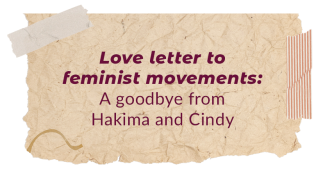
Dear feminist movements,
You welcomed us with open arms when it was announced during the 2016 AWID Forum in Bahia that we would be AWID’s new Co-EDs. It was a moment that felt full of possibility, we were building a feminist oasis that would help sustain our collective struggles forward. We left Bahia with a sharp sense of responsibility, to do our best in your service and to lead AWID in ways that would be most supportive and impactful for you.
It is now time for us to step aside for new leadership!
Over five years into our journey, we are stepping down as AWID’s Co-EDs. Our decision comes as we wrap up the current strategic cycle. We see this as an ideal moment to step aside and support a leadership refresh. We believe that transformative feminist leadership is cyclical.
We so appreciate the opportunity we had to play a role in AWID’s 40 year history, holding and shepherding the organization through the difficult context of global pandemic, and so many spiraling crises.
Feminist movements, we know you will be part of our next journey, whatever that may be. You have consistently taught us about strength and resilience. We may move to different roles, but we will collectively continue to move together.
We have vivid memories of those of you in Indonesia, Malaysia, Nepal, Thailand, Taiwan and beyond who met us to co-create the AWID Forum with so much generosity and spark. Without a doubt, our greatest regret from the last five years is that we could not give you an in-person Forum.
Once we came to the difficult (albeit necessary) decision to cancel the AWID Forum, we focused on grappling with the existential questions so many of our organizations were facing: how do we shift our ways of working to be relevant, account for the exhaustion, sickness, and grief affecting all of us in different ways? How do we build meaningful relationships when we are limited to being online? There are still no straightforward answers to these questions, but feminist movements, you have shown the way.
We were so proud to see the ways feminists were leading responses to mitigate the impacts of COVID-19 on our communities. Feminists are frontline responders in crisis and we will continue to demand recognition and resources for this work. You often responded enthusiastically to our outreach, showing up in amazing ways in our Feminist Bailout campaign and later in the Crear Resister Transform festival. You jumped into collaborative advocacy with us – whether influencing human rights spaces, policy makers or funders.
We give a special shout-out of love and respect to the current and former AWID team (both our staff and Board members) whom we’ve had the honor to work with over these years. We’ve learned from each one of you and felt deep gratitude for everything you have contributed to AWID over the years.
We came into this role as AWID’s first pair of Co-Executive Directors. We learned from the many activist and community traditions of collective leadership and the feminist organizations who had done this before us. We know that we couldn’t have done this job without each other. We were able to leverage each other’s strengths and have each other’s backs to do the best job we could.
We came into role together and are leaving together, even as we will be staggering our departure dates. We are both committed to supporting a smooth transition and deliberate onboarding of the new leadership this year.
Feminist movements, you are in great hands with the AWID team. They’ve got this. And we are proud to be leaving the organization in such a strong and resilient place. Hopefully, we’ll see many of you at the AWID Forum in 2024 – you’ll recognize us as the kicked back, relaxed folks in the audience!
Love and appreciation for all that you’ve done with and for us. Your impact on our lives stretches well beyond the last 5 years, and no doubt will continue to stretch far into the future.
Cindy & Hakima
